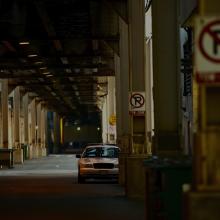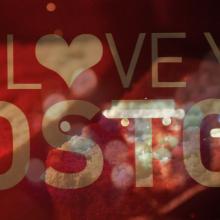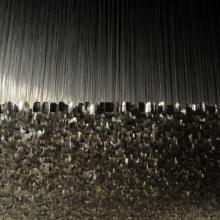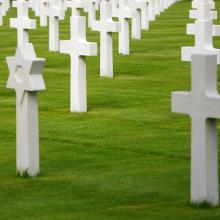Chicago
Cook County state’s attorney Anita Alvarez announced Dec. 7 that there will be no charges in the death of Ronald Johnson.
Ronald Johnson was shot and killed by Officer George Hernandez. According to Alvarez, Johnson resisted arrest and refused to drop a gun he was holding. Dashcam video of the shooting was also released. Officers had purported it shows Johnson holding a gun, but the images — dark and blurry — are inconclusive.
There is no sound on the video.
Alvarez had said she would make her decision based on "whether there was enough evidence to bring charges against the officer," reports the Chicago-Sun Times, and concluded there was not.
Johnson’s mother has sued the city and Officer Hernandez, claiming that her son was not carrying a gun.
Read more here.
My heart is very heavy tonight. The loss of black life is overwhelming today. Five were shot in Minneapolis at the hands of white supremacists last night.

Image via welcomia/Shutterstock.com
McDonald was a 17-year-old kid, gunned down by a police officer as he was walking away. The dashcam video shows Officer Jason Van Dyke shooting McDonald 16 times in the back.
But the official police story after the murder was that McDonald “refused to comply with orders to drop the knife and continued to approach the officers.”
The officers. Multiple officers witnessed the shooting, but none of them blew the whistle. Instead, they participated in a huge cover-up. It took 400 days for the video to be released. Why did it take so long?
Many speculate it’s because Emanuel was in the middle of a close election and the video would have hurt his chances of winning. To add fuel to the cover-up conspiracy, 86 minutes of footage was deleted from a Burger King security camera, including footage of the shooting. According to NBC Chicago, “a Burger King district manager said police deleted the security footage after spending more than three hours in the restaurant.”
Yeah. Emanuel and the Chicago police have trust issues.
Because in the end we are left with this fact: Laquan McDonald is another black body that didn’t matter.
We have told ourselves the story that somehow benevolent white folks acquiesced (and perhaps even saw the error of our ways) and, after a court case, “let” Mrs. Parks and all black folks sit wherever they wanted to on a bus. And, golly, looking back perhaps we were a little stringent in fussing about who sat where on a bus—but that’s all behind us now. Goodness—it sure would be nice if people would just stop talking about race!
The problem with this narrative is that it isn’t true. We in America haven’t dealt with the complicated history of what happened on Dec. 1, 1955 — or what happened before, or after. Many Americans have heard the name “Rosa Parks,” and they may have heard something about a bus. But they don’t know the history. As we look at the profound unrest and distrust in our nation, it is important to know the history.

Zacarias Pereira da Mata / Shutterstock.com
The clerk in Kentucky is still trying to avoid doing her job while arguing that religion means never having to sacrifice or compromise in any way. The war-on-Christmas crowd is still passing around that story about a red coffee cup lacking snowflakes. Those who believe in an eye-for-an-eye are cheering as bombs fall in the Middle East in response to another horrific terrorist attack. Many Christians are still ignoring the calls for justice coming from the streets of Chicago, Minneapolis, and cities all across the land.
Don’t you want to throw up your hands sometimes? Or maybe just throw up?
After more than a year, and an eventual judge order, Chicago police today released a dashcam video showing officer Jason Van Dyke shooting 17-year-old Laquan McDonald 16 times. Police released the video the same day Van Dyke was indicted on first-degree murder charges. He is being held without bail.

Photo via Leonard Zhukovsky / Shutterstock.com
Officer Jason Van Dyke has been charged with first-degree murder, one year after the shooting and killing of Laquan McDonald, 17, in October of 2014.
This is the first time a Chicago police officer has been charged with first-degree murder for an on-duty fatality in nearly 35 years, according to The Chicago Tribune.

Blaise Cupich with Pope Francis. Image via Rich Kalonick / RNS
Archbishop Blase Cupich of Chicago, named by Pope Francis to that high-profile post a year ago, has issued a powerful call for tougher gun control laws in a move that may push the volatile issue further up the Catholic hierarchy’s agenda than it has been before.
The original intent of the Constitution’s right to bear arms has been “perverted” by a gun industry that is seeking profits at any cost, Cupich wrote in an op-ed in the Chicago Tribune. The founding fathers could not have anticipated the widespread availability of “military-grade assault weapons that have turned our streets into battlefields.”
“It is no longer enough for those of us involved in civic leadership and pastoral care to comfort the bereaved and bewildered families of victims of gun violence,” he wrote in the column, which was published Oct. 9.
“We must band together to call for gun-control legislation,” he concluded.

Image via JoeyPhoto/Shutterstock
“Several of the now 15 Dyett hunger strikers returned to City Hall Monday on their 29th day without solid food to call on Mayor Rahm Emanuel to at least have a ‘respectful conversation’ with them over the future of the Bronzeville school in Washington Park.
‘A compromise happens when two people come together and they work out together something that's agreeable to both parties,’ said Jitu Brown, a leader of the hunger strike, Monday at City Hall. ‘There was no compromise.’
According to Brown, he was told about the CPS plan 15 minutes before it was presented by Chief Executive Officer Forrest Claypool. Brown said he asked to continue to negotiate, but Claypool responded, ‘We're moving forward.’
‘That's not compromise,’ Brown said.”
When Spokane Bishop Blase Cupich got a call 10 days ago with the news that Pope Francis had chosen him to be the next archbishop of Chicago — the pontiff’s most important U.S. appointment to date — he was so taken aback that he couldn’t speak for a few moments.
“To say that I was surprised doesn’t come close to the word I would use,” Cupich said Sept. 20 at a news conference in Chicago introducing him as the successor to Cardinal Francis George, who is 77 and battling cancer.
Asked by reporters how long it took for the reality of his appointment to sink in, Cupich smiled and said, “It’s still sinking in.”
A lot of other Catholics are trying to absorb the news as well, just as surprised that Francis picked the 65-year-old Cupich, who had been considered a long shot by many Vatican handicappers. They were also pleased, or concerned, that the pope had evidently chosen a bishop who shared his own emphasis on listening to the flock and caring for the poor.
“I think that he” — Francis — “sent a pastor, not a message,” Cupich told reporters.
Chicago. New York. Washington, D.C. In quick succession this year, three women have been chosen to lead historic tall-steeple churches in all these cities.
In May, the Rev. Shannon Johnson Kershner became the first woman solo senior pastor at Chicago’s Fourth Presbyterian Church. In June, the Rev. Amy Butler was elected senior pastor of New York City’s Riverside Church. And finally, in July, the Rev. Ginger Gaines-Cirelli began leading Foundry United Methodist Church in Washington, D.C.
“For women to speak in those pulpits and speak boldly as public voices in these very public buildings is very powerful,” said the Rev. Serene Jones, president of Union Theological Seminary, who recently hosted a dinner party with some of New York’s movers and shakers to welcome Butler to town.
It’s been 40 years since the Episcopal Church first ordained women, and other denominations have long included women in their clergy ranks. But these new advances are occurring sooner in the lives of these three women than some of their older counterparts. The Hartford Institute for Religion Research reports that women clergy are much more likely to serve in smaller congregations.
Scholar Diana Butler Bass hailed the arrival of these women — all in their 40s and leading large, urban, neo-Gothic churches — but also wondered if they reflect the “General Motors phenomenon.”
“Are women coming into leadership only as the institutions are collapsing?” asked Bass, author of Christianity After Religion.
A year ago this week, news headlines were filled with the story of Hadiya Pendleton. She was a 15-year-old band majorette from Chicago, who would march in the 2013 Presidential Inaugural Parade with her school. Just days after marching in the nation’s capital, Hadiya returned to Chicago’s south side where she was murdered by gunfire in Marsh Park after seeking shelter from a rainstorm. First Lady Michelle Obama attended the funeral, and Hadiya’s parents turned advocates and supporters of commonsense gun laws. The murder of Hadiya Pendleton became a painful representation of the nation’s broken gun laws and the effect that gun violence has had on the millennial generation.
Generation Progress and The Center for American Progress recently released a report: “Young Guns: How Gun Violence is Devastating the Millennial Generation.” According to the report, “American children and teenagers are 4 times more likely to die by gunfire than their counterparts in Canada, 7 times more likely than young people in Israel, and 65 times more likely to be killed with a gun than children and teenagers in the United Kingdom.” These statistics are startling and call for renewed attention to what this study has called a public health crisis.
Still Shining
David Hilfiker is a retired inner-city physician and writer on poverty and politics who has Alzheimer’s. He writes about his experience, with the hope of helping “dispel some of the fear and embarrassment” that surrounds this disease, on his blog “Watching the Lights Go Out.” www.davidhilfiker.blogspot.com
Transported
Laura Mvula is a British, classically trained musician, songwriter, and former choir director whose debut album,Sing to the Moon,is a lush fusion of soul, jazz, gospel, and pop. While not overtly “about” faith, her arrangements are imbued with spiritual longing and visions of beauty. Columbia
The election of Pope Francis in March heralded a season of surprises for the Catholic Church, but perhaps none so unexpected – and unsettling for conservatives – as the re-emergence of the late Chicago Cardinal Joseph Bernardin as a model for the American Catholic future.
While there is no indication that Francis knows the writings of Bernardin, who died in 1996, many say the pope’s remarks repeatedly evoke Bernardin’s signature teachings on the “consistent ethic of life” – the view that church doctrine champions the poor and vulnerable from womb to tomb – and on finding “common ground” to heal divisions in the church.
For nearly a decade, the ministry of Julian “J.Kwest” DeShazier has been an exploration in the relationship between music and faith. As artist, this Chicago native has used his unique rhythm to tell stories of deep meaning, inside and out of the church. A 2007 Holy Hip Hop Award winner, his song, “So Blessed,” was featured on the Grammy-nominated compilation Holy Hip Hop: Taking the Gospel to the Streets, and J has been celebrated as “Living Black History” by Urban Ministries International.
In 2012 he and his group, Verbal Kwest, were featured in the Sojourners, OXFAM, and Bread for the World-produced documentary The Line, providing a critical voice against poverty and violence in the U.S. A graduate of Morehouse College and the University of Chicago Divinity School, Julian currently serves as senior pastor of University Church in Chicago, and is a regular contributor to Sojourners, UrbanFaith and Kidult publications.
Editor's Note: There may be some objectional language in the beginning part of this about hour-long interview.
Something happened last week and I still can’t shake the funk of it off me. It happened in Boston and Texas; I saw it in Chicago as well, and the week before in Afghanistan. Last Sunday I tried to be a dutiful pastor and make sense of it from the pulpit, but ended up saying that I couldn’t make any sense of it. It wasn’t in what happened but the response. Not that they were making too much out of it — no, these tragedies were tragedies — but that maybe we weren’t making enough of it.
When the smoke of the bombs rescinded, we did what national pride dictates — we put “Boston Strong” all over everything and took up pledges to run the Boston Marathon (the first 10-miler will cause significant reassessment of this showing of national pride) — but we also began a collective process of national mourning and deep reflection, of asking, “How could this have happened?” When we knew nothing of the perpetrators, we asked instead about terrorism and mental illness — root causes (?). We expanded our search, into new territory that resembled 9/11 in some ways, back when we knew nothing and all parties were guilty parties. Accountability was spread wide, including home. This was not a search for a scapegoat but a search for the soul of a nation.
The National Veterans Art Museum in Chicago has an unusual work of art.
When visitors first enter the museum, they hear a sound like wind chimes coming from above them. Their attention is drawn upward 24 feet to the ceiling of the two-story high atrium.
The metal dog tags of the more than 58,000 service men and women who died in the Vietnam War move and chime with shifting air currents. The 10-by-40-foot sculpture, titled “Above and Beyond” was designed by Ned Broderick and Richard Steinbock.
Family and friends locate the exact dog tag of a loved one as a museum employee uses a laser to point to the tag with the name imprinted on the dog tag, now part of a chorus of wind chimes.
After the horror and tragedy in Boston, our heads have been down. This work of art serves as a reminder to look up to hear the sound of the spirit of goodness, compassion, and creativity that can turn tragedy and death into wind chimes played in silence by the air.
For many pastors of urban congregations, “stepping up” to end gun violence stems from a very personal place — as they have been forced to bury their own neighbors and church members. According to Samuel Rodriguez, gun violence – especially in urban areas – deeply affects interfaith leaders there, who are declaring violence-free zones and taking action.
Faith-based leaders in Philadelphia and Chicago have rallied to fight gun violence. Heeding God’s Call, based in Philadelphia, holds prayer vigils at the locations of gun homicides as well as organizes gun-store campaigns that ask gun store owners to sign a code of conduct.
In Chicago, All Saints Episcopal Church organized CROSSwalk, a walk through downtown Chicago, which drew a few thousand people the past two years. Violence on Chicago streets has killed more than 800 young people in the last six years.
Nuenke addressed breaking the chain of violence and pain that we see in every community. He quoted 2 Corinthians 1:3-4 and Isaiah 61 as examples of God’s compassion and its life-changing, healing power.
“What would happen if the body of Christ more fully was involved in living out Christ’s compassion in a broken world?” Nuenke asked. “Sometimes people who are hurt or experience violence end up hurting other people. The care and compassion they might receive from the Lord Jesus will impact them more in 20-30 years than anything else.”
The conversation yelling match around gun control is exhausting — both in terms of the ethical boundaries each side will breach to advance its cause, and the way our rhetoric has turned into an exercise in “crash-testing:” we always hit a wall in talking our good sense to the Dissenters, but are content to back up, add force, and try again. Because “One day, THEY will see the light. One day, THEY will become US”…
… crash!
The more gun violence we experience as a nation correlates to our panic in pursuit of the common good, however we define it. And get too many panicky people in a room – people who are certain they are right – and watch how skillfully they evade progress. I am a pastor in Chicago and I speak on behalf of all who serve in neighborhoods where violence has become the rule and not the exception: I am tired of you hitting the wall.
This course of action and righteous disrespect of Those-With-Their-Heads-You-Know-Where will not make us masters or better neighbors. It has made us dummies. And while we are arguing, our children are losing. In Chicago, and Baltimore, and Detroit, and Newtown, and in Washington. They are losing because we are competing to see who can make the wall topple over the other first. Because we are arguing over rights from the wrong perspective.
My city of Chicago, known as the City with Big Shoulders, is now on its knees. But it’s not prostrate in some humble submission to God. No. Instead Chicago is weeping from the emotional exhaustion of having to bury too many youth who have been murdered.
Last year Chicago recorded 2,400 shootings and more than 505 murders, of which more than 108 were teenagers of color from seven violent communities. Already 2013, with less than two months into its birth, has seen 49 murders. Those of us on the ground seeking to bring change to this pandemic of violence know that if the Chicago cold winters are this violent, then the hot summers will not cool off. On top of the hard and constant news about those who are killing and being killed, Chicago Police stats show that only 34 percent of the murders get solved within one year. If the detectives have two years on a case, then the rate barely reaches 50 percent. The national average of murders solved is 64 percent. New York’s rate is only 60 percent. In Chicago, though, one has a 50-50 chance of getting away with a murder.













